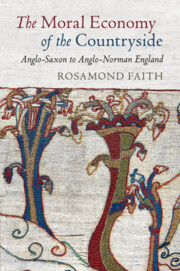Book contents
- Reviews
- The Moral Economy of the Countryside
- The Moral Economy of the Countryside
- Copyright page
- Contents
- Preface
- Abbreviations
- 1 Introduction: The Moral Economy
- Part I Rank
- 2 Lordship
- 3 Our Island Story
- 4 Honour and Respect in Peasant Society
- Part II Reciprocity
- Part III Reputation and Witness
- Part IV The Wolf Sniffs the Wind
- Part V The Aftermath of Conquest
- Part VI In the World of the Manor
- Appendix The Family Farm in Peasant Studies
- Bibliography
- Index
2 - Lordship
from Part I - Rank
Published online by Cambridge University Press: 25 October 2019
- Reviews
- The Moral Economy of the Countryside
- The Moral Economy of the Countryside
- Copyright page
- Contents
- Preface
- Abbreviations
- 1 Introduction: The Moral Economy
- Part I Rank
- 2 Lordship
- 3 Our Island Story
- 4 Honour and Respect in Peasant Society
- Part II Reciprocity
- Part III Reputation and Witness
- Part IV The Wolf Sniffs the Wind
- Part V The Aftermath of Conquest
- Part VI In the World of the Manor
- Appendix The Family Farm in Peasant Studies
- Bibliography
- Index
Summary
Chapter 2 sets to exemplify the range of meanings of lordship, one of the most important ideas that structured how people in Anglo-Saxon society thought about their world . Lordship provided a vocabulary of power: the king is ‘lord’ of all free men,. The administration of justice and maintaining social order depended very largely on individuals being ‘vouched for’ by lords who were legally bound to speak on their behalf . Lordship was idealised as a personal relationship as well as an institutional one, and poeticised in the figure of Beowulf, surrounded by his faithful troop of men. Many inland peasants were highly exploited by their land-hlafordas, the lords of the estates on which they lived and ealdormen had authority over small regions, but political authority was not yet inherent in the ownership of land: in that sense, Anglo-Saxon England was not a ‘feudal’ society. Lordship embedded hierarchy in a much closer and more personal connection through the relationship known as mannrӕdenn, ‘manrent’, or commendation.
- Type
- Chapter
- Information
- The Moral Economy of the CountrysideAnglo-Saxon to Anglo-Norman England, pp. 19 - 27Publisher: Cambridge University PressPrint publication year: 2019

